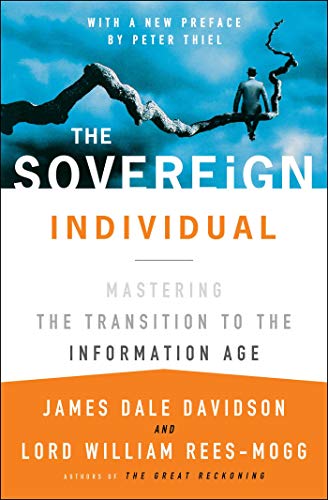The Rise of the Sovereign Individual
The concept of nation-states as we know today is fairly recent[1]. According to James Dale and William Rees in their book The Sovereign Individual, thanks to the Information Age the nation-state may not survive for many more generations.
“To prepare yourself for the world that is coming you must understand why it will be different from what most experts tell you. That involves looking closely at the hidden causes of change[2].”
The Sovereign Individual is a book about the revolution of power. The key to understanding megapolitical change, according to the authors, is understanding the factors that precipitate revolutions in the use of violence. Nation-states emerged in the Industrial Age as a way to control the exercise of power, replacing the classic non-national states and multi-ethnic empires. “During the Industrial Age prior to 1989, democracy emerged as the most military effective form of government precisely because democracy made it difficult or impossible to impose effective limits on the commandeering of resources by the state. (…) It is always costlier to draw resources from the few than from the many.” Those resources are important because they enable nation-states to provide different kinds of protection for their citizens.

As time passed, the narrative around what makes a person belong to a nation-state became more involved. Notions as country’s nationals, affinity by language or territory, or having an alleged common origin, are artificial narratives that facilitate the cohesion of the nation-state, and may change if the way power is exercised changes. Consider, for example, that at the time of the French Revolution only half of French people spoke French, and during the Italian unification the number of people speaking Italian was even lower.
The advent of the Information Age changes the dynamics of costs and rewards for the individual and will undercut the nation-state by creating affinities that supersede geographic boundaries. “It is ahistorical and wrong to think that loyalties to the land of one’s fathers, the patria, necessarily entails loyalty to an institution resembling a nation-state.” Citizenship as we know it will become less attractive as individuals can get the same services anywhere in the world.
For the first time, those who can educate and motivate themselves will be almost entirely free to invent their own work and realize the full benefits of their own productivity. (…) In an environment where the greatest source of wealth will be the ideas you have in your head rather than the physical capital alone, anyone who thinks clearly will potentially be rich. (…) Equally, in the future, one of the milestones by which you measure your financial success will be not just now many zeroes you can add to your net worth, but whether you can structure your affairs in a way that enables you to realize full individual autonomy and independence.
The information elite, the authors predict, will elect to domicile their income-earning activities in low-tax jurisdictions. Middle talent will be in vast supplies, originating in persons around the world that can rent their time for a fraction of the rates of leading industrial countries. Those who can’t lower their tax profile by relocating their tax-residence, won’t be able to compound their savings. Their living standards will decline, also because the nation-states won’t be able to pick the pockets of more productive individuals, no longer their citizens.
As Arthur C. Clarke wrote in Profiles of the Future, the two overriding reasons why attempts to anticipate the future usually fall flat are Failure of Nerve and Failure of Imagination. “Failure of Nerve seems to be the more common; it occurs when even given all the relevant facts the would-be prophet cannot see that they point to an inescapable conclusion. Some of these failures are so ludicrous as to be almost unbelievable[3].”
There is no better time to acquire what Carl Newport considers the two core abilities for thriving in the new economy: the ability to quickly master hard things, and the ability to produce at an elite level, in terms of both quality and speed.
[1] According to Wikipedia, most theories see the nation state as a 19th-century European phenomenon.
[2] Except where noted, all quoted text in this article comes from The Sovereign Individual, by James Dale and William Rees.`
[3] Clarke, Arthur C., Profiles of the Future, p. 17`
Photo by Victoria Heath on Unsplash.
